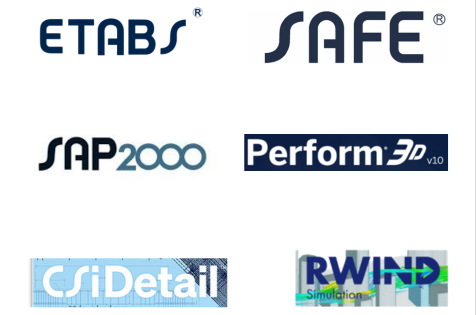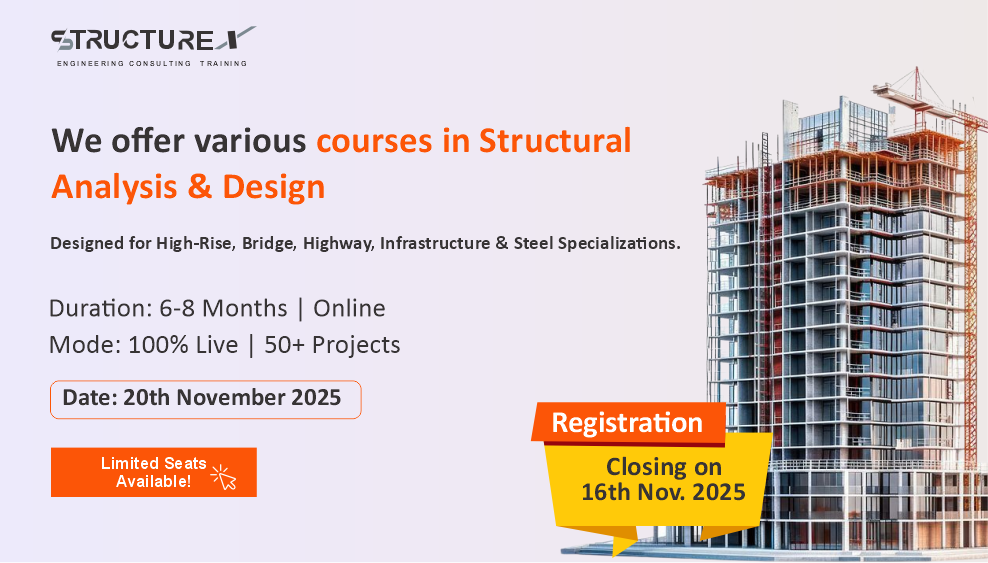PG Program in High Rise & Tall Structure
This Program is designed to provide engineers, architects, and construction professionals with cutting-edge knowledge and practical skills in the design, analysis, and construction of tall buildings.
Program Duration
6 Month-Online
Upcoming Batch
17th Nov. 2025
Download Syllabus
our goal is to bridge the gap between engineering education and industry expectations by delivering hands-on, practical, and future-ready training programs. We aim to empower civil engineers, architects, and construction professionals with real-world skills in structural design, BIM, project execution, and software mastery, enabling them to become leaders in modern infrastructure and high-rise development.
Who can join this course.
To empower the next generation of civil and structural engineers through advanced, industry-oriented training, cutting-edge software integration, and global standards. We are committed to delivering excellence in education, fostering innovation, and bridging the gap between academic knowledge and practical engineering challenges to shape a more resilient and sustainable built environment.
To be a global leader in structural engineering education and innovation, driving transformation in the construction industry through technology, research, and skilled professionals equipped to design the skylines of tomorrow
Professional, Impactful & Job-Oriented
100%
Live session with e-learning support
140+
Learning Hour
5+
Industry relevent software
10+
Live Projects
learning structural engineering
Theory & Conceptual
The program offers applied theory and conceptual classes, delivering in-depth knowledge in structural engineering. It emphasizes research and development, explores modern techniques, and addresses real-world industrial challenges.
STEP 1
Software and Manual
The program includes hands-on training with the latest structural engineering software such as ETABS, SAFE, PER3D, SAP2000, DUBAL RWIND, and CSI Detail, along with comprehensive manual calculation methods to build strong fundamental understanding.”
STEP 2
100+
Learner Enrolled
50%
Salary Hike
40%
Multinational Learner
4.8/5
Google Review
Excellent Carriculum
Analysis and design of high rise structure with codes concept and software.
11.1 Introduction
1.2 Specialized Modelling For Tall Building In ETABS
1.3 Finite Element Method
1.4 Gravity & Lateral Loading Resisting Structural System
1.5 Podium Diaphragm, Collectors, Backstay Effects
Podium diaphragm, collectors, backstay effects
22.1 Podium & Backstay Effects
2.2 Structural Element of Podium
2.3 Consideration of Backstay Effects
2.4 Design of Diaphragm & Collectors
2.5 Recommendations properties for
2.6 Modelling of Backstay Effects
Diaphragm Flexibility.
Non linear modelling
32.1 Basic Approach for Nonlinear Modelling of Structure.
2.2 An introduction to fiber Modelling Approach
2.3 Nonlinear Modelling of material (fibers).
2.4 Fiber modelling of RC Beam.
2.5 Fiber modelling of RC Column.
2.6 Fiber modelling of RC Shear Wall.
2.7 Stress-Strain Relationship-Confined Concrete.
2.8 Stress-Strain Relationship- Cyclic Load.
2.9The Moment Curvature Curve.
2.10 Hinge Properties.
2.11 Plastic Hinges.
Wind analysis
44.1 Gust Factor Method
Linear dynamics of tall building
5Performance based design of tall building
61.1 Response Spectrum Modal Analysis
1.2 Static Earthquake Analysis.
1.3 The Modal separation of seismic Analysis.
1.4 Conceptual seismic design of Tall buildings
1.5 Seismic Dynamic Behavior of Tall Building
1.6 Seismic Dampers
1.7 Elastic and design demands at the Design Basis
1.8 Earthquake Level Using RS method
Mastering the analysis & interpreting the results
71.2 Check on lateral Stability
1.3 Check on Vertical Deflection
1.4 Check on Story Drift
1.5 Torsion Irregularities Check
1.6 Soft Story Check
1.7 Check for Over turning Moment
1.8 Check for Control of Deflection
Design and analysis of foundation
81.2 CSI SAFE and MS-EXCEL
1.3 Isolated Footing
1.4 Combined Footing
1.5 Raft Foundation
1.6 Pile Foundation
1.7 Raft + Pile
1.8 Software algorithm, capabilities,
1.9 strength and weaknesses
2.0 Modelling of foundations, basements, footings.
2.1 Design of stirrups .
Research with different structural framing system
91.1 Braced Frame and Diagrid System
Braced Frames have much better strength and stiffness Bracing is a much effective than rigid joints at resisting racking deformation of the frame.
1.2 Tube System
The tube is the name given to the systems where in order to resist lateral loads (wind, seismic, etc.) a building is designed to act like a three-dimensional hollow tube.
1.3 Braced Tube System
Also known as ‘Trussed Tube’ or ‘Exterior Diagonal-tube System’ utilized for greater heights, and allows larger spacing between the columns.
1.4 Out trigger structure system
The outrigger truss is a simple trusses spanning over the full height of that story and across the full width of building.
1.5 Diagrid Structure system
The diagrid (a portmanteau of diagonal grid) is a framework of diagonally intersecting metal, concrete or wooden beams that is used in the construction of buildings and roofs.
Wind engineering (Computational Fluid Dynamics) of Tall Structure
10RWIND Simulation user interface is super ease of use with minimal necessary settings and user skills. The work flow is very simple. The input for RWIND Simulation is the surface model of the structure(CAD,.STL). The virtual wind tunnel is created around the structure. Wind speed is set. There st of the parameters are not mandatory, but available.
Wind simulation of following type of software
Low Rise RCC Structure
High Rise RCC Structure
Tall Structure
Tube Structure
Iconic Structure
Also known as ‘Trussed Tube’ or ‘Exterior Diagonal-tube System’ utilized for greater heights, and allows larger spacing between the columns.
1.4 Out trigger structure system
The outrigger truss is a simple trusses spanning over the full height of that story and across the full width of building.
1.5 Diagrid Structure system
The diagrid (a portmanteau of diagonal grid) is a framework of diagonally intersecting metal, concrete or wooden beams that is used in the construction of buildings and roofs.
Reinforcement detailing
11Reinforcement details are presented in the form of tables and schedules for groups of components,
as well as drawn in plans, elevations, and sections for individual elements.
Detailing technique according to different CODES (IS, AISC, BS etc.)
Also known as ‘Trussed Tube’ or ‘Exterior Diagonal-tube System’ utilized for greater heights, and allows larger spacing between the columns.
1.4 Out trigger structure system
The outrigger truss is a simple trusses spanning over the full height of that story and across the full width of building.
1.5 Diagrid Structure system
The diagrid (a portmanteau of diagonal grid) is a framework of diagonally intersecting metal, concrete or wooden beams that is used in the construction of buildings and roofs.
Proof checking
121.2 Structural Forms
1.3 Floor systems (concrete & steel)
Requirements
1.4 ETABS model checks
1.5 Safe model checks for slab design
1.6 Safe model checks for foundation design
Live project under program
132. G+10 Residential Building (Gurugram New Delhi) - Super structure & Sub structure
3. G+15 Hotel Building (Noida) - Super structure & Sub structure
4. G+25 Residential Building (Gurugram)- Super structure & Sub structure
5. G+41 Residential Building (Mumbai)- Super structure & Sub structure
6. G+52 High Rise Building (Commercial & Residential) (Noida) Super structure & Sub structure
7. G+84 Warl’s Tower (UAE)- Super structure & Sub structure
8. Water tank (Over headed and underground)
Research & Development Project
142. Truss Belt structure system
3. Tube Structure system
4. Tunned Mass structure system
Download Sybullash
Download Syllabus
Master 6 Software Tools

Typical project taken in program
Hospital Building
Commericial Complex Building
Multitower Building
High Rise Residential Building
Business Centre Tall Building
Office Building High Rise
Want to experince course?
Visit and sign up for the e-learning portal
We belive in learner review
We believe in the power of learner feedback to shape, improve, and inspire our programs

Mr. Krishna Sharma

Mr. Hugo Henrique

Mr. Sayandeep bhattacharjee

Mr. Vishnukant Dwivedi

Mr. Avinash Urkude

Mr. Mojeed Adesina

Er Avdhesh Negi

Mr. Ishan Nagar

Miss. Aurora Cako
Get certified as Professional Engineer

Enroll Today
Be a part of India’s top course provider, let’s start your application now!
Total Program fee
INR 62,000/-
Book your seat with INR 10,000/- only
Structurex Course benefit!
Frequently Asked Questions
Why the course is 6 Month Long?
How much time reuired in a week?
👉 Each session is 2 hours
👉 Total: 6 to 8 hours/week of guided learning
Self-practice & assignments:
👉 Average 8 hours/week for project work, practice, and software.
Is this course live or recorded.
Do i need pre-knowldge to join this course.
What is the software included?
I dont have software installed on my pc. Can i still attend the course?
In which language course will deliver?
Is their any shorter version of this course?
How Can i solve my queries?
Do i get placement and career assistance after course complitation?
Is their gaurantee of Placement ?
From mock interviews to portfolio-building, we prepare you for the real industry.
Learn. Build. Get Hired — with StructureX.
What kind of certificate i will recive after course.
✅ Program Completion Certificate (STRUCTUREX PVT. LTD.)
Issued after completing all course modules and assessments.
✅ Internship Certificate
Recognizing your practical learning and hands-on software training during the course.
✅ Project Experience Certificate (Only upon successful submission of project work)
Awarded when you complete and submit an approved real-world project as part of the program.








